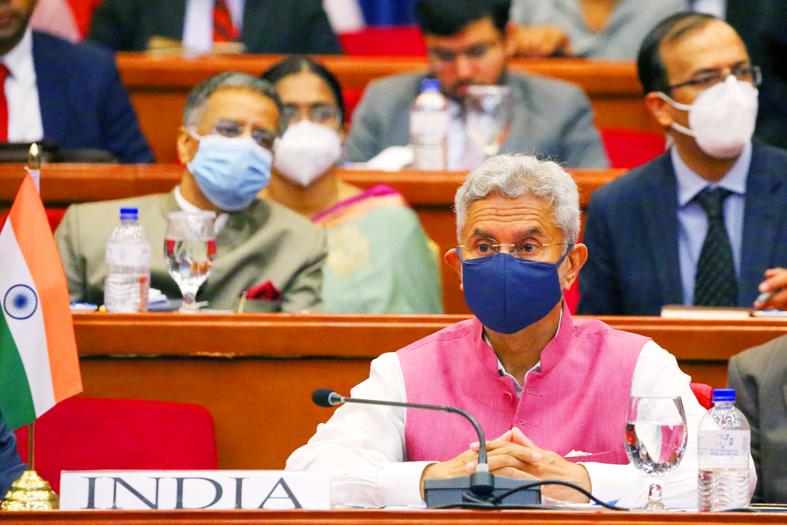India has signed an agreement to set up hybrid power projects on northern Sri Lankan islands in a deal seen as a strategic victory in its competition with China for influence in the Indian Ocean.
Indian Minister of External Affairs Subrahmanyam Jaishankar, who is in Colombo for bilateral meetings, witnessed the signing, along with Sri Lankan Minister of Foreign Affairs Gamini Peiris, the Indian embassy said late on Monday.
In December, China announced its own project to build power plants on three Sri Lankan islands was suspended due to security concerns involving a “third party.”

Photo: EPA-EFE
An Indian official said he could not confirm if the plants in the new agreement are to be built on the same islands earmarked for the Chinese project. The power source and other details on the projects were not available.
India considers Sri Lanka, just across the narrow Palk Strait off India’s southeastern coast, to be in its sphere of influence, while the island nation in the middle of a key sea route connecting the east and west, is also important to China’s ambitious “One Belt, One Road” global infrastructure initiative.
“It is kind of substantial victory for India,” said Lynn Ockersz, a senior journalist and foreign relations analyst in Sri Lanka.
“Overall, it will be in a great position to influence Sri Lanka when it comes to policy issues affecting India,” he said.
Had the Chinese power plant project been realized, it would have placed China next to India’s southern coast. India and China already have running border disputes in other regions.
Jaishankar is also taking part in the 18th Bay of Bengal Initiative for Multi-Sectoral Technical and Economic Cooperation, a meeting of Bay of Bengal nations Bangladesh, Bhutan, India, Myanmar, Nepal, Sri Lanka and Thailand for economic cooperation.
The other agreements India signed include providing a maritime rescue coordination center and building fisheries harbors in Sri Lanka.
The agreements come amid Sri Lanka’s worst economic crisis in recent memory with shortages of medicine, fuel and milk power, and daily power outages lasting for hours.
Sri Lanka has approached both India and China for help. India provided a US$1 billion credit line to buy essentials following a previous US$500 billion to buy fuel. China is considering a request for a US$2.5 billion economic assistance from Sri Lanka.
Infrastructure projects that were built on Chinese loans, but do not make money are blamed for its debt crisis. Sri Lanka’s foreign reserves are dwindling, but it has to repay US$7 billion in foreign debts this year.
China has been non-committal to a request for debt restructuring.
Beijing has invested billions of dollars in building a sea port, airport, roads and a port city on reclaimed land near Colombo harbor, which the Sri Lankan government aims to develop into a financial city.
The Sri Lankan government previously scrapped a plan to allow China outright ownership to land on the Colombo Port City and provided 62 hectares on a 99-year lease instead.

‘SWASTICAR’: Tesla CEO Elon Musk’s close association with Donald Trump has prompted opponents to brand him a ‘Nazi’ and resulted in a dramatic drop in sales Demonstrators descended on Tesla Inc dealerships across the US, and in Europe and Canada on Saturday to protest company chief Elon Musk, who has amassed extraordinary power as a top adviser to US President Donald Trump. Waving signs with messages such as “Musk is stealing our money” and “Reclaim our country,” the protests largely took place peacefully following fiery episodes of vandalism on Tesla vehicles, dealerships and other facilities in recent weeks that US officials have denounced as terrorism. Hundreds rallied on Saturday outside the Tesla dealership in Manhattan. Some blasted Musk, the world’s richest man, while others demanded the shuttering of his

TIGHT-LIPPED: UMC said it had no merger plans at the moment, after Nikkei Asia reported that the firm and GlobalFoundries were considering restarting merger talks United Microelectronics Corp (UMC, 聯電), the world’s No. 4 contract chipmaker, yesterday launched a new US$5 billion 12-inch chip factory in Singapore as part of its latest effort to diversify its manufacturing footprint amid growing geopolitical risks. The new factory, adjacent to UMC’s existing Singapore fab in the Pasir Res Wafer Fab Park, is scheduled to enter volume production next year, utilizing mature 22-nanometer and 28-nanometer process technologies, UMC said in a statement. The company plans to invest US$5 billion during the first phase of the new fab, which would have an installed capacity of 30,000 12-inch wafers per month, it said. The

MULTIFACETED: A task force has analyzed possible scenarios and created responses to assist domestic industries in dealing with US tariffs, the economics minister said The Executive Yuan is tomorrow to announce countermeasures to US President Donald Trump’s planned reciprocal tariffs, although the details of the plan would not be made public until Monday next week, Minister of Economic Affairs J.W. Kuo (郭智輝) said yesterday. The Cabinet established an economic and trade task force in November last year to deal with US trade and tariff related issues, Kuo told reporters outside the legislature in Taipei. The task force has been analyzing and evaluating all kinds of scenarios to identify suitable responses and determine how best to assist domestic industries in managing the effects of Trump’s tariffs, he

Taiwan’s official purchasing managers’ index (PMI) last month rose 0.2 percentage points to 54.2, in a second consecutive month of expansion, thanks to front-loading demand intended to avoid potential US tariff hikes, the Chung-Hua Institution for Economic Research (CIER, 中華經濟研究院) said yesterday. While short-term demand appeared robust, uncertainties rose due to US President Donald Trump’s unpredictable trade policy, CIER president Lien Hsien-ming (連賢明) told a news conference in Taipei. Taiwan’s economy this year would be characterized by high-level fluctuations and the volatility would be wilder than most expect, Lien said Demand for electronics, particularly semiconductors, continues to benefit from US technology giants’ effort